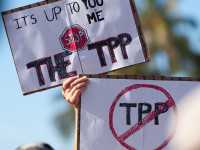Another Trouble with the TPP is its foray into the software industry. One of the more surprising provisions in the TPP’s e-commerce chapter was the inclusion of a restriction on mandated source code disclosure. Article 14.17 states:
No Party shall require the transfer of, or access to, source code of software owned by a person of another Party, as a condition for the import, distribution, sale or use of such software, or of products containing such software, in its territory.
The provision is subject to some limitations. For example, it is “limited to mass-market software or products containing such software and does not include software used for critical infrastructure.” The source code disclosure rule is not found in any other current Canadian trade agreement, though leaked documents indicate that it does appear in a draft of the Trade in Services Agreement (TISA).











